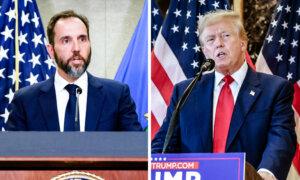The former president’s legal brief says that Smith’s evidence so far has been ‘unlawfully cherry-picked’ and ’mischaracterized.’
District of Columbia Judge Tanya Chutkan said in an order on Oct. 10 that she would release more of special counsel Jack Smith’s evidence, writing that former President Donald Trump’s concerns about the political consequences of doing so lacked legal merit.
Chutkan delayed the release of the appendix for seven days after her Oct. 10 order so that Trump could evaluate litigation options—bringing the release date to just under three weeks before the 2024 presidential election.
“There should be no further disclosures at this time of the so-called ‘evidence’ that the Special Counsel’s Office has unlawfully cherry-picked and mischaracterized—during early voting in the 2024 presidential election—in connection with an improper presidential immunity filing that has no basis in criminal procedure or judicial precedent,” the filing reads.
Chutkan’s order described Trump’s “blanket objections to further unsealing” as “without merit.”
She said that his concern about political consequences “is not a cognizable legal prejudice.”
Trump and his attorneys responded to Smith’s evidence releases by accusing him of violating the Department of Justice’s (DOJ’s) policy on actions that may impact an election.
In her Oct. 10 order, Chutkan said she didn’t need to respond to arguments about DOJ policy and that Trump “does not explain how those putative violations cause him legal prejudice in this case, nor how this court is bound by or has jurisdiction to enforce Department of Justice policy.”
Former federal prosecutor Neama Rahmani told The Epoch Times that judges “have a lot of discretion in ordering documents be sealed, so ultimately it will up to Judge Chutkan to determine when Trump has met this burden.”
“The evidence being damaging during a presidential election isn’t enough, though,” he said.
Regardless of Chutkan’s decision, Smith’s actions have provoked opinions about DOJ policy.
Smith’s immunity filing on Oct. 2 was unusual in size and sequence as it preceded the defense’s own updated motion to dismiss on immunity.
Chutkan has repeatedly said she wouldn’t let the case yield to an election timeline, but many have criticized the DOJ for bringing its case when it did.
Former Federal Election Commission member Hans von Spakovsky, who is also a senior legal fellow at The Heritage Foundation, told The Epoch Times that Smith’s immunity filing was “blatant election interference at its worst.”
“That allegation is false,” it said, adding that the special counsel’s “mandate is to uphold the law. It has no role or interest in partisan politics and has faithfully executed its prosecutorial duties in this case.”
Detailed Communications
The release of Smith’s immunity appendix would contain redactions but, like his motion, could contain evidence that casts a negative light on Trump and his associates before both the election and Trump’s detailed response in court.
Smith’s lengthy immunity brief attempted to show that Trump was criminally liable despite the Supreme Court’s landmark ruling on immunity.
It detailed communications among Trump, his legal team, the campaign, and White House staff.
Among other things, the brief contained an allegation that a White House staffer overheard Trump telling his family that “it doesn’t matter if you won or lost the election. You still have to fight like hell.”
Rahmani told The Epoch Times that the motion is “important because it helps prove Trump’s knowledge that he lost the election and his intent to overcome the results nonetheless.”
Roger Severino, a former DOJ attorney and Trump administration official, told The Epoch Times he doubts Smith could win with the case he has presented.
“They’re still grasping at straws to get a criminal conspiracy,” he said.
Smith, according to Severino, needed to prove not only that Trump’s conduct wasn’t immune but that multiple people intentionally planned to deceive and did so for the purpose of obstruction.
Much of the case could be effectively decided with the November election, which, if Trump wins, would almost certainly lead to him withdrawing the case upon entering office.
If he doesn’t win, he could be looking at years in prison and will be defending himself on multiple fronts—including motions to dismiss.
On immunity, criminal defense attorney Keith Johnson told The Epoch Times that Trump would frame his communications with staff as official.
The defense argument will center on “Trump speaking [with] high-level government employees, not campaign staffers, which they will state is evidence these were official presidential communications,” Johnson said.
Original News Source Link – Epoch Times
Running For Office? Conservative Campaign Consulting – Election Day Strategies!


